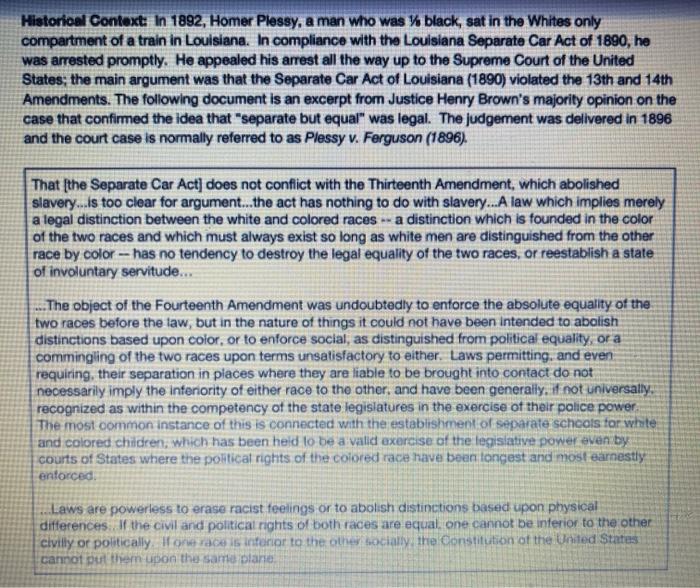
Historical Context: In 1892, Homer Plessy, a man who was ) black, sat in the Whites only compartment of a train in Louisiana. In compliance with the Louisiana Separate Car Act of 1890, he was arrested promptly. He appealed his arrest all the way up to the Supreme Court of the United States, the main argument was that the Separate Car Act of Louisiana (1890) violated the 13th and 14th Amendments. The following document is an excerpt from Justice Henry Brown's majority opinion on the case that confirmed the idea that "separate but equal" was legal. The judgement was delivered in 1896 and the court case is normally referred to as Plessy v. Ferguson (1896). That (the Separate Car Act) does not conflict with the Thirteenth Amendment, which abolished slavery...is too clear for argument...the act has nothing to do with slavery...A law which implies merely a legal distinction between the white and colored races -- a distinction which is founded in the color of the two races and which must always exist so long as white men are distinguished from the other race by color -- has no tendency to destroy the legal equality of the two races, or reestablish a state of involuntary servitude... ...The object of the Fourteenth Amendment was undoubtedly to enforce the absolute equality of the two races before the taw, but in the nature of things it could not have been intended to abolish distinctions based upon color, or to enforce social, as distinguished from political equality, or a commingling of the two races upon terms unsatisfactory to either. Laws permitting, and even requiring their separation in places where they are liable to be brought into contact do not necessarily imply the inferority of either race to the other, and have been generally, if not universally. recognized as within the competency of the state legislatures in the exercise of their police power The most common instance of this is connected with the establishment of separate schools for white and colored chidren, which has been held to be a valid exercise of the legislative power even by courts of States where the political rights of the colored race have been longest and most earnestly entorced Laws are powerless to erase racist feelings or to abolish distinctions based upon physical differences. If the civil and political rights of both races are equal, one cannot be interior to the other clvilly or politically love is intentor to the other socially, the Constitution of the United States cannot put them upon the same plane
1.pdf Coen wir 1) Sourcing and Contextualization: When was this document written? When was this document written in relation to the document you reviewed in part 1? 2) Contextualization: If the Supreme Court states that a law is constitutional, can the same kind of law be written by other states? Why or why not? ninata the 13th
1.pal 3) Close Reading: According to the document, why did the Separate Car Act not violate the 13th Amendment? Cite evidence from the text. 4) Close Reading According to the document, why did the Separate Car Act not violate the 14th Amendment? Cite evidence from the text.
没有找到相关结果